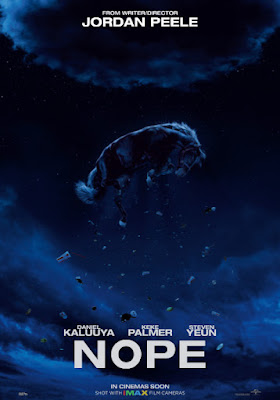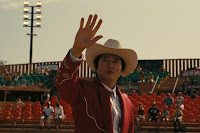Jordan Peele's latest film exists in an alternate reality where the Fry’s Electronic big box stores are still in business. Unfortunately, the California-based chain closed in February 2022, before filming even started. They blamed the pandemic, but it was really the lockdown that killed them. More chaos comes to California, specifically Hollywood ranch country, in Jordan Peele’s Nope, which screens during MoMI’s Curator’s Choice series.
The Haywood family has handled horses for Hollywood productions for years, but OJ and Emerald’s late father Otis Sr. was the face of the business. Business has been off since he was fatally killed by debris mysteriously falling from the sky. Since then, his adult children have been forced to sell horses to Ricky “Jupe” Park, a former child actor, who now hosts a western-themed amusement park. They have also lost horses to apparent UFO abductions.
Emerald convinces O.J. documenting alien activity could reverse their precarious fortunes. Naturally, they drop by their convenient neighborhood Fry’s Electronic, where Angel Torres fixes them up with surveillance gear. After installing everything, he taps himself in too, because he wants to believe. Unfortunately, the supposed UFO always cuts electric power, but he sees enough to officially team-up with the Haywoods, joining with them to recruit acclaimed cinematographer Antlers Holst, who is famed for his ability to get any shot. Holst also happens to own his own hand-cranked IMAX camera, so he definitely has the right gear.
Peele spends a disproportionate amount of time on Park’s backstory, particularly when his chimpanzee co-star went nuts a killed the entire cast of his sitcom, leaving him as the sole survivor. It is a masterfully brutal and surreal flashback scene, but it clashes with the reserved emotional tone of the rest of the film. The metaphor also becomes heavy-handed, when Park’s sense of his own charmed life leads to spectacular tragedy. Nevertheless, it is some of Terry Notary’s most interesting simian work, since The Circle.
Many pie-in-the-sky interpretive theories have been applied to the sneaker seen balancing on its toe throughout the chimp’s rampage. You name it, someone thinks it symbolizes it. However, the truth is probably simpler (and sort of cooler). Peele produced the latest Twilight Zone reboot, which several times referred back to Rod Serling’s original series. Most likely it is an homage to the episode “A Penny for Your Thoughts,” in which otherworldly things happen while a dropped coin remains standing on its edge, where it landed.
Nevertheless, Nope, like Us, lends itself more to creative analysis than his over-hyped Get Out, which is a major reason why both are substantially superior films. Even though it looks like an alien abduction movie, Nope is indeed a horror film, which Get Out was not (it is a slightly fantastical thriller that is never really scary). When it fully reveals itself, there is an atmosphere of menace to Nope that is seriously creepy.
The second half of Nope comes together pretty well, while still serving up Muybridge Ester eggs to satisfy his fanatical admirers. Daniel Kaluuya is appropriate lowkey and reticent for a real-life cowboy, which is what he is. On the other hand, Steven Yeun nicely evokes Park’s trauma, despite the fact Peele loses control of his subplot (it is clear he has reached the point where nobody can edit him). Yet, the real standout is grizzled Michael Wincott, who turns out to be weirdly eccentric under his crusty exterior. Of course, it is always good to see the legendary Keith David, albeit appearing briefly as the ill-fated Otis Sr.
Yes, there are clever parallels and hidden homages to Peele’s previous film, but the important thing is the thing, which is something somewhat different. It is also a heck of a lethal challenge to deal with it. It is a good film, but it should have been much tighter, particularly during the first act. Recommended for fans of sf-flavored horror, Nope screens Friday (12/30) at MoMI, as part of Curator’s Choice—and it streams on Peacock.

